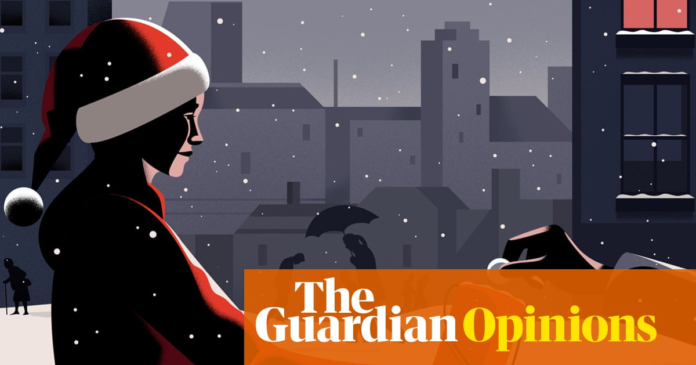Please bookmark for future updates
There is something inescapably bleak about a nation that relies on charity appeals to fix its social and economic problems
“Will Santa find me?” a subject line in my inbox asked last week. I wondered briefly if my niece had moved to email with her questions about the logistics of gift delivery. In fact, it was from Refuge: a Christmas appeal for children spending the holidays with their mums in a women’s shelter.
Over the past fortnight, I’ve seen more marketing for charities than supermarkets: from Instagram ads by Crisis hosting Christmas dinner and support for homeless people to X posts by Action for Children hoping to get gifts for kids whose parents can’t afford one.
Cash-strapped charities are smart to try to squeeze every last drop from the season of goodwill: the British public are expected to give an estimated £2.8bn to good causes during November and December this year, according to research by the Charities Aid Foundation (CAF). The festive period is typically the peak for generosity, when half of the public say they always or usually donate to charity compared with the third of people who regularly give money throughout the rest of the year.
It’s heartwarming in some respects. At a time when most of us splurge on Baileys and novelty jumpers, all while the weather turns colder, it’s not trite to say we should think of those struggling to even buy regular warm meals. I’m ambassador for the Hygiene Bank and I know its Shower People With Kindness campaign – which aims to get shampoo and deodorant to people in poverty this Christmas – will be a lifeline for many.
And yet there is something inescapably bleak about a Britain that relies on philanthropy to tackle its social and economic problems. After years of cuts to public services and growing destitution, charities increasingly provide anything from food packages and debt advice to housing support. The safety net once provided by the social security system and council services has been outsourced to a patchwork of grassroots groups, to the point where meeting basic human needs – being fed, clothed and housed – relies on fundraising in December as well as taxation in April.
This is Victorian Christmas 2024, in which the strains of poverty and disability are eased – not by the welfare state – but the kindness of strangers. Forget fair benefits or decent wages, there are volunteers with Santa hats outside John Lewis shaking buckets for change.
This is clearly inadequate for the level of need out there. As of last month, more than 16 million people are living in poverty, or a staggering 24% of the UK population – the highest since records began. Over 9 million of these are in deep poverty, meaning they’re struggling to afford enough food or pay energy bills. More than a million children don’t even have their own bed. It’s no surprise that a survey of voluntary organisations by the CAF found that 86% say demand for their services has increased over the past year, with poverty-relief charities reporting the biggest rise. Goodwill alone cannot fix the holes in the safety net.
Philanthropy as a means to address hardship isn’t just impractical – it’s wrong. It ignores the structural inequalities that lead to poverty and illness and lets the state off its responsibility to fix them. It suggests the problem is a lack of individual generosity rather than how we collectively organise the economy and society. It robs people of the dignity and autonomy that tax-funded support can bring, forcing the poorest to hold a figurative begging bowl up in place of their rights. Or to put it another way: no one should have to use a donation bin to have clean hair for Christmas.
Moreover, the normalisation of charity shifts the conversation away from taxation as the means to redistribute the country’s increasingly unequal wealth. Just last week, the Conservative leader, Kemi Badenoch, floated the idea of a flat tax rate that would see the richest taxed at the same level as the poorest. Such a policy would simply be the next step in how the ruling class already protects its interests, where the wealthy write a cheque to the local hospital while hiring an accountant to wriggle out of a big tax bill. If you want to see this attitude in practice, look to the rightwing newspapers that launch charity appeals for people in hardship at Christmas after spending the previous 11 months championing the very policies that impoverished them.
In a year that finally saw the end of the latest era of Tory rule, the potential – and limits – of government has felt particularly palpable. With more than one in three children below the breadline after a decade of austerity, children’s charities are in the unenviable position of trying to clear up the mess politicians have left. When I see the Barnardo’s Christmas appeal for warm blankets and pyjamas for children, I cannot help but think of Labour’s refusal to scrap the two-child benefit limit this year.
Clement Attlee said: “Charity is a cold grey loveless thing. If a rich man wants to help the poor, he should pay his taxes gladly, not dole out money at a whim.” As we hurtle into 2025, perhaps it is time our society edged towards such progress. Modern Britain should not be run like the final pages of A Christmas Carol, in which Tiny Tim must rely on Scrooge waking up in a good mood to be permitted to live. Donate to a good cause this Christmas, please. But don’t forget the unseasonal truth: every time a charity helps a person find food or clothes, it is a sign of government failure.
Frances Ryan is a Guardian columnist
Create an account
Welcome! Register for an account
A password will be e-mailed to you.
Password recovery
Recover your password
A password will be e-mailed to you.
Friday, December 27, 2024

